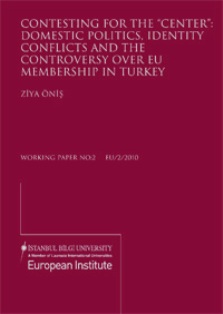
CONTESTING FOR THE “CENTER”:DOMESTIC POLITICS, IDENTITY CONFLICTS AND THE CONTROVERSY OVER EU MEMBERSHIP IN TURKEY
Ziya Öniş, August 2009, Working Paper No: 2 EU/2/2010
“Westernization” has been a major goal of Turkish political elites in the contemporary era. The roots of this interest can be traced to the late Ottoman times. Westernization in this context is synonymous with modernization, progress and reaching the highest civilizational standards; in other words, obtaining a first division status, in terms of economic performance, democratic credentials and other performance criteria that one could identify. Becoming a member of the European “club” was a natural objective in this direction. Although frequent references have been made to the value of Turkish membership in terms of its contribution to fostering inter-civilization dialogue, possible economic benefits and enhancement of European security, there is no doubt that the primary emphasis has been on the role that EU membership could play in Turkey’s own national transformation. Indeed, in the recent era, we observe the dramatic impact of the Europeanization process in Turkey motivated by the signal for full-membership in the three inter-related areas of the economy, democratization process and foreign policy behavior. In spite of a decline of momentum in recent years, it is very much a real and on-going process which would be very hard to reverse.

